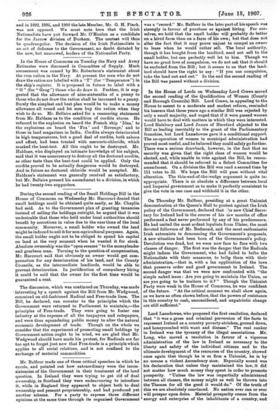In the House of Lords on Wednesday Lord Crewe moved
the second reading of the Qualification of Women (County and Borough Councils) Bill. Lord Come, in appealing to the House to assent to a moderate and modest reform, reminded his hearers that three years ago a similar Bill was rejected by only a small majority, and urged that if it were passed women would have to deal with matters in which they were interested. Lord Halsbury and Lord Tames of Hereford objected to the Bill as leading inevitably to the grant of the Parliamentary franchise, but Lord Lansdowne gave it a conditional support. The co-operation of women in municipal administration had proved most useful, and he believed they could safely go f urther. There was a serious drawback, however, in the fact that no security wait given that the right class of women would be elected, and, while unable to vote against the Bill, he recom- mended that it should be referred to a Select Committee for amendment. On a division the Bill was read a second time by 111 votes to 33. We hope the Bill will pass without vital alteration. The thin-end-of-the-wedge argument is quite in- appropriate. There is SO absolute a difference between local and Imperial government as to make it perfectly consistent to give the vote in one case and withhold it in the other.






































 Previous page
Previous page